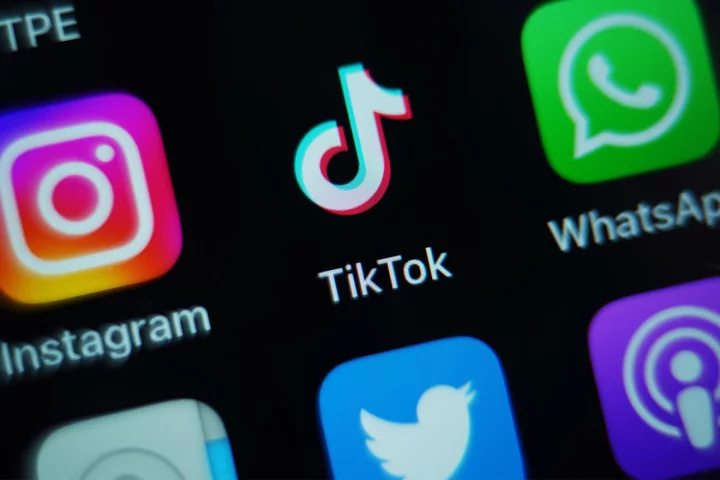
Relax Fund Portfolio Manager, AI Isn’t Taking Your Job—Yet
Stocks with ties to artificial intelligence have been on a roll. But AI has yet to prove its worth in helping exchange-traded funds design portfolios or pick stocks.
2023-10-18 14:27

TikTok is now most favourable single source of news in teenagers in the UK, research shows
TikTok is now the most used single source of news across all platforms for teenagers in the UK, new research from Ofcom has found. The regulator’s News Consumption In The UK 2022/23 report found TikTok is the favoured single news source among 12 to 15-year-olds. TikTok is most popular with young people and used by 28 per cent of teenagers, followed by YouTube and Instagram, both at 25 per cent, according to the figures. But, taking into account all news content across its platforms, the BBC still has the highest reach of any news organisation among this age group – used by 39 per cent of teenagers. Over the last 12 months we've seen most major publishers refocus their strategy, partly as otherwise there's more risk of young people seeing unreliable news Nic Newman, Reuters Institute for the Study of Journalism It comes after the UK Government banned ministers from using TikTok, which is a Chinese-owned video-sharing app, on their work phones following a security review. The House of Commons and the Lords also cited security concerns as they decided to ban the app across the Palace of Westminster. TikTok, owned by Chinese internet company ByteDance, argues it does not share data with China. However, Beijing’s intelligence legislation requires firms to help the Communist Party when requested. Nic Newman, senior research associate at the Reuters Institute for the Study of Journalism, said there is a big shift taking place in terms of how people consume news and that more publishers have been joining TikTok. He said: “TikTok, Snapchat, Instagram, the people younger people are listening to tend to be influencers, personalities, they film for a range of reasons – in some instances you have specific news creators, in other cases it’s just personalities, comedians, talking about issues including free school meals. “In terms of the implications for the industry, one of the things we’ve really seen in the last 12 months is we have publishers who are very reluctant to go into TikTok, but over the last 12 months we’ve seen most major publishers refocus their strategy, partly as otherwise there’s more risk of young people seeing unreliable news. “That’s more challenging as there’s no business model for TikTok, so it’s very hard. “It’s just starting to build relationships with young people. “There’s been surveys that show TikTok is amongst the least trusted platforms, partly as it’s one of the newest.” He added: “During the war in Ukraine we saw young people going to traditional news brands – but not for very long, it depends what the subject is to some extent. “Covid was a big change because people were at home and people were talking about Covid on TikTok and people had a bit of time. “That’s a case of very serious news being carried on TikTok. “Passions and celebrity news, that’s a big part of what’s going on with the younger people, but there’s also serious news, that’s the wider big shift.” When considering perceptions of trust, teenagers rated traditional sources better than their online counterparts, as BBC One/Two was trusted by 82 per cent of its teenage users, compared to TikTok at 32 per cent, Instagram at 38 per cent, Facebook at 41 per cent and Snapchat at 31 per cent. Twitter was the exception, with a 50 per cent rating on trust, Ofcom found. The news topics of most interest to younger teens generally are “sports or sports personalities” (23per cent), “music news or singers” (15 per cent), “celebrities or famous people” (11 per cent), “serious things going on in the UK” (8 per cent) and news about “animals or the environment” (9). Meanwhile, those aged 16-24 are much less likely than the average adult to access news from traditional media sources, such as TV (47 per cent vs 70 per cent), radio (25 per cent vs 40 per cent) and print newspapers (16 per cent vs 26 per cent). Social media platforms dominate the top five most popular news sources among 16-24s. Instagram is the most-used single news source at 44 per cent, followed by Facebook at 33 per cent, Twitter at 31 per cent, and TikTok at 29 per cent. Coming in joint second, BBC One at 33 per cent is the only traditional media source to feature in the top five. But Ofcom said its figures show broadcast TV news maintains its position as the most popular source among adults in the UK, used by 70 per cent, which rises to 75 per cent when broadcast video on-demand news content is included. BBC One remains the most-used news single source across all platforms at 49 per cent, followed by ITV at 34 per cent – although both channels have seen gradual declines over the past five years as they are down from 62 per cent and 41 per cent respectively. Similarly, Facebook – the third most popular news source among adults – is showing signs of decline, from 33 per cent to 30 per cent over the same period. TikTok’s popularity as a source of news for adults is growing, with one in 10 adults saying they use it to keep up with the latest stories – overtaking BBC Radio 1 and Channel 5, both at 8 per cent for the first time. TikTok, at 55 per cent, along with Instagram, at 53 per cent, is particularly popular among adults for celebrity news. Twitter is the favoured destination for breaking news, with 61 per cent of adults choosing it, and political news, at 45 per cent, while Facebook is the preferred source for local news, at 59 per cent. Among users of the platforms, news sourced via social media is rated lower for trust, accuracy and impartiality than the more traditional sources of news, but is rated moderately well on “offers a range of opinions”, “helps me understand what’s going on in the world today” and being “important to me personally”. One in ten (10 per cent) 16-24s claims to consume no news – twice the figure for all adults. After a long-term decline in the use of print newspapers – with overall reach of these news brands being supplemented by their digital platforms – Ofcom’s most recent data shows print newspaper reach was consistent between 2022 and 2023. Just over a quarter of adults (26 per cent) accessed news via print newspapers, increasing to 39 per cent when including their online platforms. The Daily Mail/Mail on Sunday and The Guardian/Observer were the most widely-read print and digital news titles overall. Read More Charity boss speaks out over ‘traumatic’ encounter with royal aide Ukraine war’s heaviest fight rages in east - follow live Talk of AI dangers has ‘run ahead of the technology’, says Nick Clegg Eurostar passengers can avoid UK passport checks by having faces scanned ‘Hostile states using organised crime gangs as proxies in the UK’
2023-07-20 12:16

Mexcian girl who was bullied at school has a higher IQ than Einstein and Stephen Hawking
A young girl who was bullied for being autistic may have a higher IQ than Stephen Hawking or Albert Einstein. Adhara Maite Pérez Sánchez, an 11-year-old from Tláhuac, Mexico, is being described as a prodigy by many after recently graduating with a degree in Systems Engineering. She is now going on to study industrial engineering. The extraordinary girl has a passion for astronomy and space, expressing the dream to become the first Mexican woman to travel to space as an astronaut and has given talks about her interest and knowledge of aerospace. She intends to become an astronaut at NASA, and is currently taking courses in astronomy and gravitational waves at the National Autonomous University of Mexico (UNAM), which is widely regarded as a top research university. Sign up to our free Indy100 weekly newsletter Adhara has also had her achievements recognised in 2021 by the Senate of the Republic, as well as being declared one of Mexico’s 100 most influential women, and appearing on the cover Marie Claire Mexico. However, life hasn’t always been easy for Adhara, who struggled with being bullied by her classmates. Often labelled as a ‘weirdo’ for her autism. Adhara was diagnosed with Asperger’s at 3 years old, but has succeeded greatly with it. Recently she has begun developing a bracelet designed to monitor the emotions of children such as herself in order to improve their communication skills. But she hasn’t let the negativity bring her down. Determined to succeed and achieve her goals in spite of what others say about her. Her inspirations include late physicist, Stephen Hawking, and Carmen Félix, a Mexican engineer currently developing a plan to launch a manned mission to Mars. Have your say in our news democracy. Click the upvote icon at the top of the page to help raise this article through the indy100 rankings.
2023-05-23 00:25

Get a lifetime of Microsoft Office and a like-new laptop for under $200
TL;DR: As of May 20, get a Lenovo ThinkPad with a lifetime Microsoft Office license
2023-05-20 17:51

Thought Leaders at Zayed Sustainability Prize Forum Highlight Pathways to Drive Progress for People and Planet
NEW YORK--(BUSINESS WIRE)--Sep 21, 2023--
2023-09-22 02:59

Save more than $500 on a refurbished iPad Pro
TL;DR: As of July 23, you can snag a refurbished iPad Pro (128GB, WiFi) for
2023-07-23 17:51

Get a great deal on a wireless gaming mouse, on sale for $49.99
TL;DR: As of June 8, you can get the MOJO M2 Performance Wireless Gaming Mouse
2023-06-08 17:54

Warzone Resurgence Vengeance Icon Explained
Warzone Resurgence Vengeance Icons provide players with the general direction of the enemy that killed their squadmate in Season 4.
2023-06-09 04:47

Intel Is in Talks to Be an Anchor Investor in Chip Designer Arm’s IPO
British chip designer Arm Ltd., backed by SoftBank Group Corp., is in talks with potential strategic investors including
2023-06-13 09:22

Elon Musk’s X Corp sued by another social network company named X
Elon Musk’s X Corp, the company formerly known as Twitter, is being sued by another social network also named X, a lawsuit filed in a federal court revealed. The lawsuit, filed by a Florida-based ad agency X Social Media LLC, alleged that the popular social media platform violates Florida common law because of “unfair competition and trademark and service mark infringement”. It also accused the company owned by Mr Musk of violating Florida’s Deceptive and Unfair Trade Practices Act (FDUPTA). The accusing company said it has existed in the American state with its registered trademark as “X SOCIALMEDIA” continuously since 2016. It said it has existed as “a vanguard in utilizing social media and marketing technology to connect consumers with legal services in situations where those harmed would otherwise remain voiceless and without remedy”. The Florida-based company, founded in 2015 by entrepreneur Jacob Malherbe, said its “distinctive” and “dominant” letter “X” is used to signify the beginning of a life-changing journey towards justice. The ad firm said its ”X” mark is successfully associated with its social media advertising services, adding that it has invested “over $2m to date” in building brand awareness and reaching consumers. It argued that it has “already suffered loss in revenue that correlates with X Corp’s rebrand and use of the mark ‘X’.” “In addition to the symbolic emphasis of the ‘X’, X Social Media frequently emphasizes the ‘X’ portion of its mark throughout its advertising, blogs, and newsletters highlighting its work,” the company said. “X Corp’s use of the ‘X’ mark and recent attempt to register the mark in association with social media, business data, promotion and advertising, business consulting, market research services, and advertising services necessitates this action because its conduct has caused and will continue to cause serious irreparable harm to X Social Media,” the ad agency says. It remains to be seen how X Corp would respond to the lawsuit. X Corp did not immediately respond to The Independent’s request for comment. Read More Elon Musk facing defamation lawsuit in Texas over posts that falsely identified man in protest Elon Musk mocked by Ukraine’s parliament over tweet taunting Zelensky Elon Musk to live stream himself gaming on X in ‘everything app’ bid Elon Musk to live stream himself gaming on X in ‘everything app’ bid Musk confirms he is cutting election integrity staff from X/Twitter ahead of 2024 Reddit will start paying people to post
2023-10-03 12:58

Can You Refund Your Fortnite Account?
Players can get refunds to their Fortnite accounts by contacting Epic Games or applying for a FTC refund for purchases from January 2017 to September 2022.
2023-09-28 03:49

Zscaler Had a Good Quarter. Why Analysts Aren’t Worried About Its Stock Fall.
Zscaler stock is suffering despite Wall Street hailing the last quarter as evidence of its strong business. The security-software company’s caution about its guidance looks to have disappointed the market but analysts aren’t too concerned.
2023-11-28 19:50
You Might Like...

AI operated drone ‘kills’ human operator in chilling US test mission

HyperX in Collaboration with Influencer Valkyrae Announces Third HX3D Personalized Keycap

Buying a PS5? Sony Is Offering You a Free Game

Retail traders reignite rally in GameStop shares

Does Tristan Tate run a brothel? Controversial influencer suggests troll to 'look for job' after grave accusation: 'Nothing to do with pimping'

The Nordstrom Anniversary Sale Is Back—and Here Are 65 of the Best Deals You Don’t Want To Miss

Investors With $8 Trillion Target Australia Over Climate Change

Kranti Ponnam, Esteemed Business Leader, Joins Forbes Business Council
